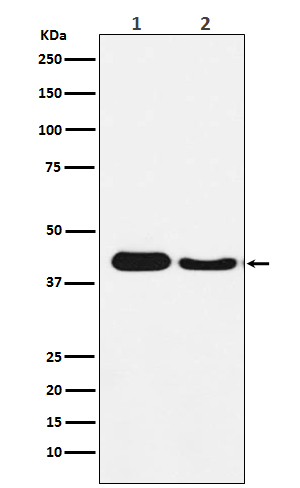Atg4A Rabbit mAb [bIk2]Cat NO.: A51816
Western blot(SDS PAGE) analysis of extracts from (1) HepG2 cell lysate; (2) Mouse brain lysate.Using Atg4A Rabbit mAb [bIk2]at dilution of 1:1000 incubated at 4℃ over night.
Product information
Protein names :Apg4a; ATG4A; Atg4al; AUT like 2 cysteine endopeptidase; Autl2; Autophagin 2; Autophagin-2; Autophagy related 4A cysteine peptidase;
UniProtID :Q8WYN0
MASS(da) :45,378
MW(kDa) :45kDa
Form :Liquid
Purification :Affinity-chromatography
Host :Rabbit
Isotype : IgG
sensitivity :Endogenous
Reactivity :Human,Mouse,Rat
- ApplicationDilution
- 免疫印迹(WB)1:1000-2000
- 免疫组化(IHC)1:100
- The optimal dilutions should be determined by the end user
Specificity :Antibody is produced by immunizing animals with A synthesized peptide derived from human Atg4A
Storage :Antibody store in 10 mM PBS, 0.5mg/ml BSA, 50% glycerol. Shipped at 4°C. Store at-20°C or -80°C. Products are valid for one natural year of receipt.Avoid repeated freeze / thaw cycles.
WB Positive detected :(1) HepG2 cell lysate; (2) Mouse brain lysate.
Function : Cysteine protease that plays a key role in autophagy by mediating both proteolytic activation and delipidation of ATG8 family proteins (PubMed:15169837, PubMed:12473658, PubMed:17347651, PubMed:21177865, PubMed:21245471, PubMed:22302004, PubMed:32732290). The protease activity is required for proteolytic activation of ATG8 family proteins: cleaves the C-terminal amino acid of ATG8 proteins to reveal a C-terminal glycine (PubMed:15169837, PubMed:12473658, PubMed:17347651, PubMed:21177865, PubMed:21245471, PubMed:22302004). Exposure of the glycine at the C-terminus is essential for ATG8 proteins conjugation to phosphatidylethanolamine (PE) and insertion to membranes, which is necessary for autophagy (PubMed:15169837, PubMed:12473658, PubMed:17347651, PubMed:21177865, PubMed:21245471, PubMed:22302004). Preferred substrate is GABARAPL2 followed by MAP1LC3A and GABARAP (PubMed:15169837, PubMed:12473658, PubMed:17347651, PubMed:21177865, PubMed:21245471, PubMed:22302004). Protease activity is also required to counteract formation of high-molecular weight conjugates of ATG8 proteins (ATG8ylation): acts as a deubiquitinating-like enzyme that removes ATG8 conjugated to other proteins, such as ATG3 (PubMed:31315929, PubMed:33773106). In addition to the protease activity, also mediates delipidation of ATG8 family proteins (PubMed:29458288, PubMed:33909989). Catalyzes delipidation of PE-conjugated forms of ATG8 proteins during macroautophagy (PubMed:29458288, PubMed:33909989). Compared to ATG4B, the major protein for proteolytic activation of ATG8 proteins, shows weaker ability to cleave the C-terminal amino acid of ATG8 proteins, while it displays stronger delipidation activity (PubMed:29458288). Involved in phagophore growth during mitophagy independently of its protease activity and of ATG8 proteins: acts by regulating ATG9A trafficking to mitochondria and promoting phagophore-endoplasmic reticulum contacts during the lipid transfer phase of mitophagy (PubMed:33773106)..
Subcellular locationi :Cytoplasm.
IMPORTANT: For western blots, incubate membrane with diluted primary antibody in 1% w/v BSA, 1X TBST at 4°C overnight.


